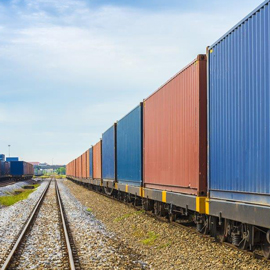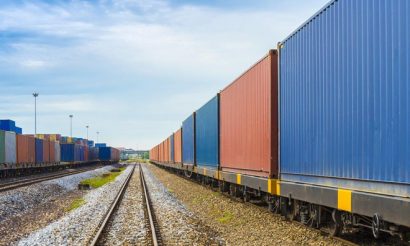Destination: Efficiency
Arrival Time: Spring 2017
Posted: 1 September 2016 | | No comments yet
Claire Yeates, Director at Waterscan – an independent consultancy specialising in water sustainability – discusses the impact of next year’s overhaul of the English water supply market and explains how the rail industry can benefit from the opportunity.


Claire Yeates, Director at Waterscan – an independent consultancy specialising in water sustainability – discusses the impact of next year’s overhaul of the English water supply market and explains how the rail industry can benefit from the opportunity.


The benefits of market reform are well known in the rail sector: increased efficiencies, improved customer service levels and choice being key drivers for sector segmentation.
In April 2017, the English water supply market is on target for a long-planned overhaul too. The move will create the largest retail water market in the World, with 1.2 million customers and a total market value of £2.4 billion. This water revolution should help to overcome many of the complexities of the current water supply system, such as price variations, metering issues, billing inefficiencies and overly convoluted tariff structures expects OFWAT, the market regulator.
But, the question remains whether opening up the water market will deliver everything commercial operations are hoping for and how can the rail industry benefit from the opportunity?
Firstly, let’s outline what’s changing. Water is currently supplied according to the location of the customer, with water suppliers operating as a monopoly in each region. The new open market will give companies the opportunity to optimise their water supply agreements and/or switch to the supplier who will give them the best price and service, regardless of where the business operates. The new competitive market will be split into wholesale businesses (focused on water treatment and supply) and retail businesses (responsible for front end consumer services and billing).
“Water consumption across the rail network is considerable when you combine both back-end operations such as train washing, office and staff facilities and front-end customer facing operations like station facilities, catering and washroom”
If you’re a multi-site operation you could already be dealing with numerous different water companies – all of which operate varying tariff structures – so consolidating billing and switching to a single supplier should save considerable admin time and effort. In Scotland, where the market has already opened, over 130,000 commercial customers are already enjoying the benefits of being able to shop around for water with savings of over 25% already achieved.
Water consumption across the rail network is considerable when you combine both back-end operations such as train washing, office and staff facilities and front-end customer facing operations like station facilities, catering and washrooms. The opportunities for cost savings and a boost to sustainability credentials could be significant for many operators if they wise up to water.
The Route to Efficiency
Getting your water procurement strategy in order will set you on the right tracks. The first step for any company is to get a good understanding of the business’s current operational water footprint through our free Water Check analysis. This will enable us to determine how much water is used, where, when and how across your infrastructure, before designing a bespoke water reduction and procurement strategy to meet your organisational goals. This will stand you in good stead ahead of water company negotiations in April 2017.
Next, consider the longer term benefits that can be achieved through a comprehensive approach to water management. Water – and associated cost – savings can be made in a number of ways and, as there’s no risk to operational continuity, the options are worth exploring. Leak detection and correction, validation of surface water drainage charges and water re-use initiative could all play a part.
Rainwater Harvesting can reduce mains water consumption by up to 30% making it a good option for organisations with expansive roof areas. Greywater Recycling, which could be beneficial for companies operating train washing facilities, can save as much as 40%. Aside from lower metered water bills, there’s the added benefit of reduced risks of storm water flooding, decreased sewerage charges and lower energy costs associated with water supply through deploying such technologies.
“A project we recently undertook for Govia Thameslink/Southern Railway will save approximately 70% of current water consumption at the station train wash”
A project we recently undertook for Govia Thameslink/Southern Railway will save approximately 70% of current water consumption at the station train wash. This gives substantial savings in both supply and sewerage charges. With increasing water scarcity in the UK as a result of climate change, it also mitigates any risk of a drought order preventing the trains being cleaned. Our recycling system is designed to filter the train wash water by removing the suspended debris to enable the water to be re-used. In another project for one of the UK’s largest logistics operations, we identified cost savings of £340,000 per annum, with a 34% reduction in water consumption at one warehouse site alone.
On The Right Tracks
It seems like more organisations in the logistics and transport sector are waking up to water as we have seen a surge in enquiries ahead of the market shake-up. But there are other drivers for action too. Firstly, there’s the need for stringent cost management at a time of potentially prolonged economic uncertainty. Secondly, there’s compliance within the regulatory framework of the Water Act and associated environmental legislation and targets.
Water is often seen as a largely insignificant figure on the P&L but sound water management can have both a fast and long-term positive impact on the bottom line. Don’t let a lack of water wisdom derail your budgets and sustainability agenda.
Find out more about Waterscan’s innovative and comprehensive approach to water management at www.waterscan.com or call 01243 839 880.



